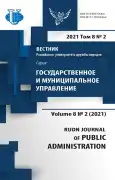The Presidential Grants Fund as an Instrument of the Policy of Remembrance for the Great Patriotic War
- 作者: Belov S.I.1
-
隶属关系:
- Lomonosov Moscow State University
- 期: 卷 8, 编号 2 (2021)
- 页面: 173-185
- 栏目: Public administration: theory and practice
- URL: https://journal-vniispk.ru/2312-8313/article/view/317644
- DOI: https://doi.org/10.22363/2312-8313-2021-8-2-173-185
- ID: 317644
如何引用文章
详细
The presented research is devoted to the study of the role of the Presidential Grants Fund in the implementation of the memorial policy in relation to the events of the Great Patriotic War. The methodological base of the study is formed through a combination of comparative and structural analysis. The author concludes that the activity of the Presidential Grants Fund on the field of memorial policy is built outside the context of a clear strategy for implementing the policy of memory. Currently, the Fund allocates funds primarily to support local and regional initiatives that are not linked to each other in a single system. There is a clear imbalance in the territorial distribution of grants in terms of their number and size in favor of projects of participants from Moscow and St. Petersburg. Part of the grants is allocated for the solution of tasks assigned by law to the sphere of responsibility of local self-government bodies (for example, this concerns projects for the improvement of military graves).
作者简介
Sergey Belov
Lomonosov Moscow State University
编辑信件的主要联系方式.
Email: Belov2006s@yandex.ru
ORCID iD: 0000-0002-1464-040X
PhD in History, Associate Professor of the Department of Russian Politics
1, Leninskiye Gory str., Moscow, Russian Federation, 119991参考
- Gribanova A.O., Bazarov R.T. Grantovaja podderzhka gosudarstva kak metod investirovanija v NKO [State Grant Support as a Method of Investing in Non-profit Organizations]. Scientific and methodological electronic journal Concept. 2016; 11: 3341–3345 (In Russ.).
- Malinova O.Yu. Aktual’noe proshloe: simvolicheskaja politika vlastvujushhej jelity i dilemmy rossijskoj identichnosti [The Current Past: Symbolic Politics of the Ruling Elite and the Dilemmas of Russian Identity]. Moscow: Politicheskaja jenciklopedija; 2015. 207 p. (In Russ.).
- Nemtsev A.V. Nekommercheskie organizacii regionov Rossii kak sub#ekt obshhestvennoj diplomatii [Non-profit Organizations of Russian Regions as a Subject of Public Diplomacy]. Power. 2018; 2: 64–67 (In Russ.).
- Smirnov V.A. Jeffektivnost’ grantovoj podderzhki rossijskih social’no-orientirovannyh nekommercheskih organizacij (na primere Fonda prezidentskih grantov) [The Effectiveness of Grant Support to Russian Socially Oriented Non-profit Organizations (on the Example of the Presidential Grants Fund)]. Sociological Research. 2020; 9: 79–89 (In Russ.).
- Fedorova T.E. Gosudarstvennye istochniki finansirovanija NKO altajskogo kraja (na primere prezidentskih grantov) [State Sources of Funding for NGOs in the Altai Territory (by the Example of Presidential Grants)]. Science Is my Choice! Collection of Materials of the VI Regional Youth Conference, XLVI scientific conference of students, undergraduates, graduate students and students of lyceum classes. Barnaul; 2020: 2339–2344 (In Russ.).
- Davydenkova A.G., Arefiev M.A., Kozlova T.I., Osipov I.D. Opyt raboty s grantom RGNF po teme «teorija i istorija rossijskogo samoupravlenija» [Experience with a Grant from the Russian Humanitarian Science Foundation on the Topic “Theory and History of Russian Self-government”]. Legal State: History of Ideas and Practice of Implementation in Russia. Materials of the Interuniversity scientific-practical conference. Institute of Law and Entrepreneurship; under the general editorship of T.I. Kozlova. SPb.; 2003: 31–33 (In Russ.).
- Zhuravlev V.V. Problemy novejshej istorii Rossii v issledovanijah soiskatelej grantov RGNF [Problems of the Modern History of Russia in Research of Applicants for Grants from the Russian Humanitarian Science Foundation]. Bulletin of the Russian Humanitarian Scientific Foundation. 2014; 3 (76): 52–63 (In Russ.).
- Molchanov I.N., Shulgina M.V. Razvitie finansovoj sredy nekommercheskih organizacij Rossii [Development of the Financial Environment of Non-commercial Organizations in Russia]. Bulletin of the Financial University. 2017; 1 (97): 35–47 (In Russ.).
- Ukolova V.I. Vseobshhaja istorija v zerkale grantov RGNF [General History in the Mirror of Grants from the Russian Humanitarian Science Foundation]. Bulletin of the Russian Humanitarian Science Foundation. 2006; 1 (42): 5–9 (In Russ.).
- Gigauri D.I. Politika pamjati v praktike social’nogo konstruirovanija politicheskoj identichnosti [The Politics of Memory in the Practice of Social Construction of Political Identity]. Historical, Philosophical, Political and Legal Sciences, Cultural Studies and Art History. Questions of Theory and Practice. 2015; 10-1 (60): 59–64 (In Russ.).
- Dyukov A.R. Istoricheskaja politika ili politicheskaja pamjat’ [Historical Politics or Political Memory]. International Life. 2010; 1: 133–148 (In Russ.).
- Efremenko D.V., Malinova O.Yu., Miller A.I. Politika pamjati i istoricheskaja nauka [The Politics of Memory and Historical Science]. Russian History. 2018; 5: 128–140 (In Russ.).
- Malinova O.Yu., Miller A.I. Vvedenie. Simvolicheskaja politika i politika pamjati [Introduction. Symbolic Politics and Politics of Memory]. Symbolic Aspects of Politics of Memory in Modern Russia and Eastern Europe: A Collection of Articles / Ed. V.V. Lapin and A.I. Miller. 2021: 7–37 (In Russ.).
- Samarkina I.V. Sovetskoe v identichnosti sovremennoj rossijskoj molodezhi [Soviet in the Identity of Modern Russian Youth]. Problems of National Security of Russia: Lessons of History and Modern Challenges. 25 Years without the Soviet Union. 29th Adler Readings. Collection of articles of the international conference. Adler; 2016: 173–177 (In Russ.).
- Shnirelman V.A. Social’naja pamjat’ i obrazy proshlogo [Social Memory and Images of the Past]. The New Past. 2016; 1: 100 – 129 (In Russ.).
- Apaydin V. The Interlinkage of Cultural Memory, Heritage and Discourses of Construction, Transformation and Destruction. Critical Perspectives on Cultural Memory and Heritage: Construction, Transformation and Destruction. London: UCL Press; 2020: 13–30.
- Foster A-M. “We Decided the Museum Would Be the Best Place for Them”: Veterans, Families and Mementos of the First World War. History and Memory. 2019; 31 (1): 87–117.
- Glisic I., Edele M. The Memory Revolution Meets the Digital Age: Red Army Soldiers Remember World War II. Geschichte und Gesellschaft. 2019; 45 (1): 95–119.
补充文件










